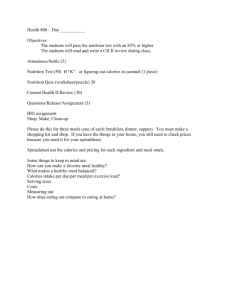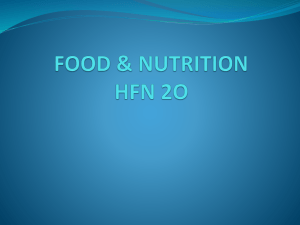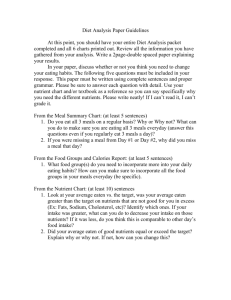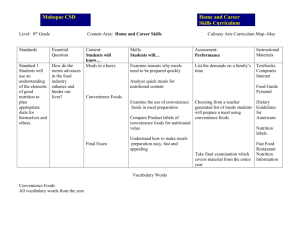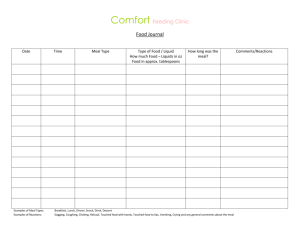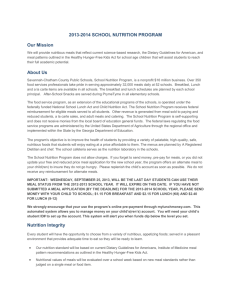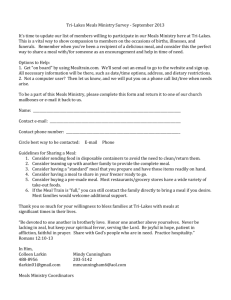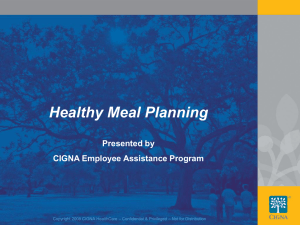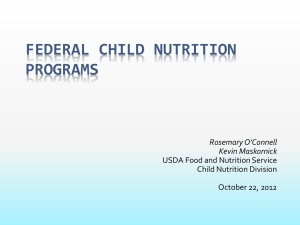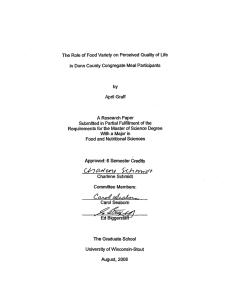Trends in Auditing
advertisement
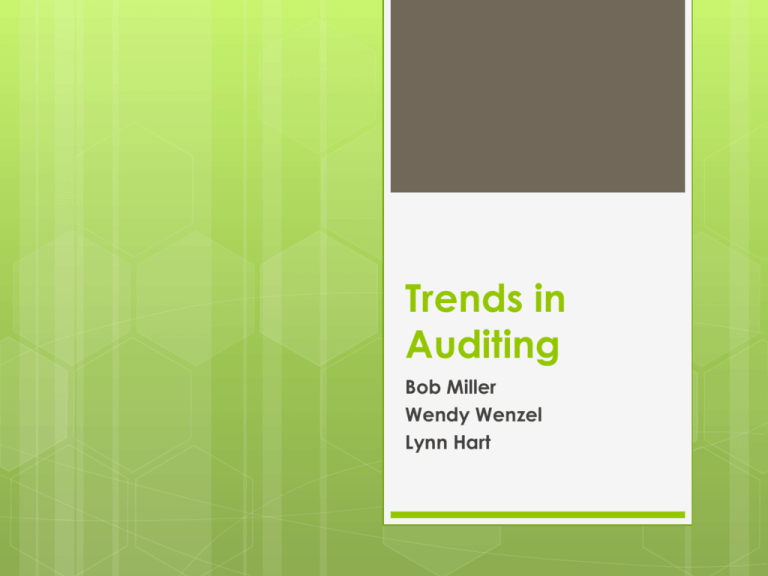
Trends in Auditing Bob Miller Wendy Wenzel Lynn Hart Biggest Challenges Sodium and Nutrient Analysis Finding: Sodium in the congregate and HDM program is above the Dietary Guideline recommendations 800 mg per meal and above the DRI recommendations which are 500 mg per meal (desired amount is no higher than 800 mg sodium per meal). Necessary Action: Take steps to correct this by making adjustments to menus. Lowering Sodium Check food labels and purchase low sodium products whenever feasible. Make sure that cheeses, breads, baked goods and cereals contain <215 mg per serving. Ensure that canned vegetables, frozen fish and seafood contain < 290 mg per serving. Check to make sure that canned meat, portion controlled items and convenience foods (ex. breaded fish, chicken, veal patties, pasta dishes) contain < 480 mg per serving. Purchase reduced sodium soy sauce, ketchup and salad dressings. Review menu analysis and check that the correct products are reflected in the nutrient analysis. Data input errors can happen and produce an incorrect nutrient analysis which can appear to make the meal higher sodium than it actually is. Nutrient Analysis in Detail Must be all inclusive “Nutrient Values for Meal Planning and Evaluation” Each meal must have its own nutrient analysis-even frozen weekend meals. List of Nutrition Software Products • CALCMENU www.calcmenu.com/ • Computrition www.computrition.com/ • Dave Johnson Nutrition www.djsoft.com/ • DietAid www.shannonsoft.com/ • DietMaster www.lifestylestech.com/ • Dine Healthy www.dinesystems.com/ • Food Processor, Esha Research www.esha.com • Food Smart www.food-smart.com/ • FoodWorks, Nutrition Company www.nutritionco.com • Fuel Nutrition Software www.logiform.ca/fuel/pro_an.htm • Mealformation Software www.mealformation.com/ • Nutribase 2001 Clinical, CyberSoft, Inc. www.nutribase.com • Nutritionist Pro, First Databank www.firstdatabank.com • SureQuest Software www.surequest.com/products.htm Biggest Challenges The “two hour rule” 90-PI-26 D. Meal Service The Area Agency on Aging shall ensure that: Efforts are made to conserve the nutritive value, flavor and appearance of foods at all stages of food preparation, delivery and service with particular attention made to minimize the holding time of hot foods. There shall be no more than two hours between the time of completion of cooking and the beginning of serving for foods which need to be held at a temperature above 140 degrees F. For home delivered meals, this applies to the last meal served on the route. Two hour rule….. Not all food safety related Based on the Older Americans Act The Older Americans Act Section. 339. NUTRITION. A State that establishes and operates a nutrition project under this chapter shall provides meals that— (B) provides flexibility to local nutrition providers in designing meals that are appealing to program participants, (i) comply with the most recent Dietary Guidelines for Americans, published by the Secretary and the Secretary of Agriculture, (ii) provide to each participating older individual— (I) a minimum of 33 1/3 percent…one meal per day, (II) a minimum of 66 2⁄3 percent…two meals per day, and (III) 100 percent…three meals per day (C) encourages providers to enter into contracts that limit the amount of time meals must spend in transit before they are consumed, (F) comply with applicable provisions of State or local laws regarding the safe and sanitary handling of food, equipment, and supplies used in the storage, preparation, service, and delivery of meals to an older individual, Biggest Challenges Regulation 90-PI-26 I.G.8. Each provider must conduct orientation and training at least quarterly for staff and volunteers. Training plans, schedules and attendance must be documented. Finding: The AAA did not document training provided to other staff and volunteers on a quarterly basis. Corrective Action: The AAA must begin documenting training provided to all staff on a quarterly basis. Please submit the most recent training, including a copy of the agenda and attendance records given to all staff. Facts: Most AAA’s are providing training, at a minimum on a quarterly basis. Some AAA’s are providing training monthly, exceeding the requirement! What’s wrong???? Biggest Challenges "If it's not in writing, it didn't happen." Documentation gives substance to a workplace's activities. It may difficult for employees to remember everything if it was only presented verbally. During an emergency, staff and participants might not remember the proper procedure to exit the building without documentation (evacuation plan). Documentation provides standards to a workplace. Questions? Lynn Hart, MS, RD, CDN Aging Services Nutrition Consultant Email: lynn.hart@aging.ny.gov Phone: 518-474-4945
